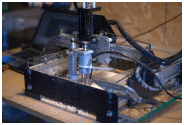News
Five Geek Projects
At the end of last week I slipped on a wet floor, did a wild, balletic (or so I thought) attempt to recover, and wrenched my knee and leg. The next four days were a blur of X-rays and Vicodin. Luckily nothing broken, but I've had better weekends.
I spent much of Saturday and Sunday browsing the Web and adding to my growing list of "Stuff I Must Write About". As an experiment, this week I'm going to give you a tasting menu of products and services you really should check out ...

Shapeoko* Shapeoko: This is a low cost Computer Numerical Control (CNC) machine for milling all kinds of materials, including plastics, woods, metals, and maybe even chocolate. The Shapeoko is available as a DIY, open source tool that can mill objects up to 7.87 inches along both X and Y axes, and 3.5 inches on the Z axis. You can use software such as Google Sketchup, Autodesk 123D, TinkerCAD, or Inkscape to create your objects. The mechanical parts-only kit is $199, the full kit is $649, and the premium kit, $999. The developers of the product are approaching this as a "jumpstart" kind of business and want 150 orders if they are to deliver any units at all. At the time of this writing they have 107 on order with 19 days to go ... I'd be surprised if they don't go to production. I might need one myself ...
* TinkerCAD: While I'm at it, check out TinkerCAD ... this is an impressive online service (written in JavaScript) for HTML5 compatible browsers with the WebGL library) that lets you create simple 3D objects and then print them using one of a number of fabricating services such as Shapeways. Rating: 5 out of 5
![]()
* Arena Partslist: If you have a need to create parts lists for any project, check this service out. It is cheap at $9 per user per month but free for personal use (for example, for your open source 3D fab projects). This is a slick, polished system that makes creating and managing a bill of materials extremely easy. Rating: 5 out of 5
* MongoDB: This NoSQL, free, open-source database is getting a lot of attention these days. Why? My theory is based on Darwinian evolution ... "looser" standards (in biology, less specialized genotypes) have a better chance of fitting a "natural" niche environment for success at survival (the dimensions of a "natural" niche aren't, in reality, so overly restrictive as to be unsurvivable for a reasonable number of individual implementations to flourish). As a friend of mine, John Hoebing, noted, "[MongoDB's] table/row/column replacement of collection/document/field is so much looser than [SQL]. Mongo [claims] that horizontal scalability is the killer app, but I'm guessing it's more the relaxed structure. Still, I am impressed, and am going to use [MongoDB] for my next db. Who doesn't need less structure?"

* Disk Doctor: So, is your OS X system running out of disk space? You've just installed an app or you started a new video project and you've got a warning that your startup disk is running out of space? Try Disk Doctor. It will scan your drive and examine your application caches, logs, extra languages (which can chew up a lot of space), your trash can, as well as your file and email downloads (the latter two items are usually minimal overheads) and at the click of a button, remove them. For $1.99 this utility is great value. Rating: 5 out of 5
Gibbs has a potpourri of products in Ventura, Calif. Your collection of delights to gearhead@gibbs.com and follow him on Twitter (@quistuipater) and on Facebook (quistuipater)
- Cover Story
-
 SketchUp Can Help You Win Interior..
SketchUp Can Help You Win Interior.. -
 Best Laptops for SketchUp
Best Laptops for SketchUp -
 How to Resize Textures and Materials..
How to Resize Textures and Materials.. -
 Discovering SketchUp 2020
Discovering SketchUp 2020 -
 Line Rendering with SketchUp and VRay
Line Rendering with SketchUp and VRay -
 Pushing The Boundary with architectural
Pushing The Boundary with architectural -
 Trimble Visiting Professionals Program
Trimble Visiting Professionals Program -
 Diagonal Tile Planning in SketchUp
Diagonal Tile Planning in SketchUp -
 Highlights of some amazing 3D Printed
Highlights of some amazing 3D Printed -
 Review of a new SketchUp Guide
Review of a new SketchUp Guide
- Sketchup Resources
-
 SKP for iphone/ipad
SKP for iphone/ipad -
 SKP for terrain modeling
SKP for terrain modeling -
 Pool Water In Vray Sketchup
Pool Water In Vray Sketchup -
 Rendering Optimization In Vray Sketchup
Rendering Optimization In Vray Sketchup -
 Background Modification In sketchup
Background Modification In sketchup -
 Grass Making with sketchup fur plugin
Grass Making with sketchup fur plugin -
 Landscape designing in Sketchup
Landscape designing in Sketchup -
 Apply styles with sketchup
Apply styles with sketchup -
 Bedroom Making with sketchup
Bedroom Making with sketchup -
 Review of Rendering Software
Review of Rendering Software -
 Enhancing rendering for 3d modeling
Enhancing rendering for 3d modeling -
 The combination of sketchup
The combination of sketchup -
 Exterior Night Scene rendering with vray
Exterior Night Scene rendering with vray






